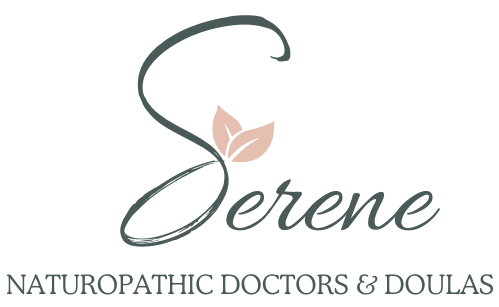
Understanding PCOS: Criteria, Prevalence in Canada, Underlying Causes & Naturopathic Strategies
Struggling with PCOS? Polycystic ovary syndrome (PCOS) is one of the most common endocrine disorders in women of reproductive age, yet its presentation and management can vary widely. As a Naturopathic Doctor at Toronto’s Serene Clinic, my goal is to help you recognize whether PCOS fits your health story, understand its root drivers, and partner with you to choose treatments—both conventional and naturopathic—that align with your needs.
Serene Clinic Holistic Doctor Toronto . Book Your Free Consultation Today
Diagnostic Criteria: Rotterdam Consensus
A PCOS diagnosis is clinical, based on meeting two of the following three criteria in the absence of other causes PMC:
- Oligo- or anovulation
- Clinical and/or biochemical hyperandrogenism (e.g., hirsutism, elevated serum testosterone)
- Polycystic ovarian morphology on ultrasound (>12 follicles/ovary or ovarian volume >10 mL)
Other definitions (NIH 1990; Androgen Excess PCOS Society 2006) either require different combinations or tighten hormonal thresholds, but Rotterdam remains the most widely applied in clinical practice CMAJ.
Serene Clinic Holistic Doctor Toronto . Book Your Free Consultation Today
How Common Is PCOS in Canada?
- ~1.4 million Canadian women are estimated to be affected by PCOS JOGC.
- Globally, PCOS impacts 6–13% of reproductive-aged women, though up to 70% remain undiagnosed World Health Organization (WHO).
What Causes PCOS?
PCOS is a heterogeneous syndrome with a multifactorial etiology:
- Genetic predisposition: Family clustering and twin studies support heritability
- Insulin resistance: Present in 50–70% of PCOS patients, driving ovarian androgen production Frontiers
- Hormonal imbalances: Excess luteinizing hormone (LH), low sex-hormone binding globulin (SHBG)
- Environmental/lifestyle factors: Obesity, sedentary habits, high-glycemic diets can exacerbate symptoms
- In utero androgen exposure: Emerging evidence suggests prenatal androgen levels may program PCOS risk
Serene Clinic Naturopathic Doula Book Your Free Consultation Today
PCOS Phenotypes: Tailoring Your Treatment
Not all PCOS looks the same. Based on Rotterdam, women fall into four phenotypes PMC:
| Phenotype | Features | Prevalence |
| A | Hyperandrogenism + Oligo/anovulation + Polycystic ovaries | 67.7% |
| B | Hyperandrogenism + Oligo/anovulation | 11% |
| C | Hyperandrogenism + Polycystic ovaries | 17.7% |
| D | Oligo/anovulation + Polycystic ovaries | 3.6% |
Understanding your phenotype guides both medication choices and naturopathic support.
Naturopathic Approaches to PCOS
While the birth control pill effectively regulates cycles and reduces androgenic symptoms, it doesn’t address underlying insulin resistance or metabolic dysfunction—and some women wish to avoid hormonal contraception long-term. Here’s how an integrative, naturopathic protocol can help:
Serene Clinic Naturopathic Doula Book Your Free Consultation Today
1. Optimize Insulin Sensitivity
- Myo-Inositol + D-Chiro Inositol (40:1): 2 g + 50 mg twice daily improves ovulation and lowers insulin ResearchGate.
- N-Acetylcysteine (NAC): 600 mg BID boosts glutathione, supports insulin action.
- Alpha-Lipoic Acid: 300 mg BID enhances glucose uptake and antioxidation.
2. Balance Hormones Naturally
- Vitex (Chaste Tree): Can support luteal-phase progesterone (use off-label if avoiding OCP).
- Spearmint Tea: Managing Testosterone levels
- Adaptogens (Ashwagandha, Rhodiola): Modulate HPA axis to reduce cortisol-driven androgen excess.
3. Support Ovarian & Metabolic Health
- Omega-3 (EPA/DHA): Anti-inflammatory and lipid-modulating benefits.
- Coenzyme Q₁₀: To bolster mitochondrial function in oocytes.
- Vitamin D₃: To optimize insulin signaling and reproductive function.
4. Diet & Lifestyle Foundations
- Low-Glycemic, Whole-Foods Diet: Emphasize fiber, quality protein, and healthy fats.
- Regular Movement: Aim for 150 min/week mixed cardio + strength training.
- Stress Reduction & Sleep Hygiene: Prioritize 7–8 hours/night; consider mindfulness or gentle yoga.
5. Working with (or Without) the Pill
- If on OCP: Use naturopathic supplements to mitigate metabolic side effects (e.g., insulin resistance, nutrient depletion).
- If off OCP: Cycle-support botanicals (e.g., vitex) and nutrient repletion ensure you’re not simply trading cycle regulation for untreated metabolic risk.
Taking the Next Steps
- Assessment: Complete history, hormone panels (Day 3 LH/FSH, testosterone, insulin), and ultrasound for ovarian morphology.
- Phenotype-Directed Plan: Match your clinical picture to targeted therapies.
- Ongoing Support: Regular follow-up for lab monitoring, dose adjustments, and lifestyle coaching.
Struggling with PCOS? At Serene Naturopathic Doctors & Doulas, we empower you to understand your unique PCOS presentation, decide whether and how to use hormonal contraception, and harness naturopathic tools to restore balance—helping you move from diagnosis to lasting wellness.
Book today to understand, treat and take control of your hormones.
Serene Naturopathic Doctors & Doulas
Empowering families through personalized, evidence-based care.
Want to Learn More?
Struggling with PCOS? Book a free 15-minute consultation with one of our naturopathic doulas and discover how we can support your pregnancy, birth, and beyond.
To match with a Naturopathic Doctor, please reach out to us at sereneclinic.ca or serene.healthclinic@gmail.com
Serene Clinic Naturopathic Medicine Book Your Free Consultation Today
Connect with a Naturopathic Doctor and Doula near you, whether you are in Toronto or anywhere in Ontario.
Serene Clinic Naturopathic Doctors Book your complimentary meet and greet with an Ontario licensed Naturopathic Doctor and Doula:
https://sereneclinic.janeapp.com
Frequently Asked Questions
Polycystic Ovary Syndrome (PCOS) is a hormonal disorder diagnosed using criteria like irregular periods, high androgen levels, and ovarian cysts. Naturopathic doctors often combine hormone panels, cycle tracking, and lifestyle analysis for a holistic diagnosis.
Yes, PCOS can be managed naturally through diet, lifestyle changes, herbal medicine, and supplements that target insulin resistance, hormone imbalance, and inflammation—without relying on hormonal contraception.
Top evidence-based supplements include Myo-Inositol, D-Chiro Inositol, N-Acetylcysteine (NAC), Alpha-Lipoic Acid, Omega-3, Vitex, and Vitamin D—each supporting insulin sensitivity, hormonal balance, and ovarian function.
Insulin resistance is a major driver of PCOS in up to 70% of cases. It leads to excess androgen production, weight gain, and irregular cycles. Natural treatments aim to improve insulin sensitivity through targeted supplements and diet.
Absolutely. Naturopathic care improves ovulation, egg quality, and hormonal health, which enhances fertility. Treatments include cycle-regulating herbs, nutrition, and stress-reducing protocols.
While PCOS is a chronic condition, many symptoms—like irregular cycles, acne, hirsutism, and fatigue—can be significantly reduced or reversed with consistent naturopathic care and lifestyle changes.
Avoid high-glycemic foods, refined carbs, processed sugar, and trans fats. These worsen insulin resistance and inflammation. Instead, focus on fiber-rich whole foods, lean proteins, and healthy fats.
Yes, there are four PCOS phenotypes based on symptoms like androgen levels, ovulation, and cysts. Identifying your phenotype helps tailor both naturopathic and medical treatments.
Many patients notice improvements in 3–6 months with consistent treatment, especially in cycle regulation, energy levels, and skin health. Fertility outcomes may take longer depending on individual health factors.
Yes, naturopathic and conventional treatments can complement each other. For example, if you’re on the pill, naturopathic support can reduce side effects and address root causes like insulin resistance.
Booking a free consultation is easy. Simply visit our website at Serene Clinic Toronto, click on “Book a Free Consultation,” and choose your preferred time. We’ll review your symptoms, labs, and goals to personalize your PCOS care plan—naturally and holistically.






